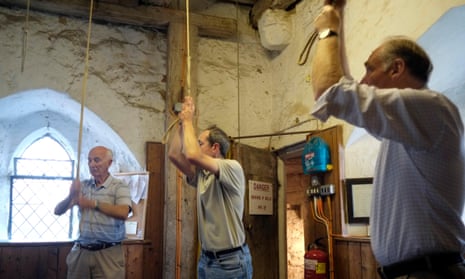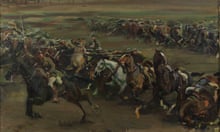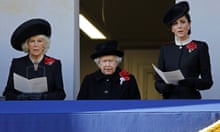The British and German governments are issuing a unique joint appeal to communities across the world to ring their church, military and other bells in unison on Armistice Day to mark the hundredth anniversary of the end of the first world war.
Across the UK, many thousands of bellringers at more than 3,000 towers are already preparing to join the international initiative to celebrate the day the guns fell silent after more than four years of fighting – and the peace and friendship that now exists between former enemies.
Q&AShare your stories for Armistice Day 100 years on
Show
Whether
your family members or someone you know were in active service, or in some
supporting role at home or abroad, we’d like to hear their stories, and will be featuring some of them as we approach the 100th anniversary of the end of the first world war.
We’re interested in contributions from people from all countries that were involved in the war and stories that show celebration or loss.
Share your letters, stories and photographs via this form. You can
read terms of service here.
The culture secretary, Jeremy Wright, told the Observer that the Anglo-German-led project would be an appropriate way to draw to an end, in sound, more than four years of commemorative events. “Bells will ring out across the world to replicate the outpouring of relief that took place in 1918, and to mark the peace and friendship that we now enjoy between nations,” he said. “It will be a fitting culmination to our first world war commemorations. One hundred years on, we will come together to remember all those who lost their lives – regardless of nationality.”
Christopher O’Mahony, president of the Central Council of Church Bellringers, said the sound of bells pealing in the UK would change from a sombre and solemn “half-muffled” one in early morning to a more celebratory tone, similar to a wedding, at 12.30. At midday we will take the muffles off the bells and at 12.30 it will be more about celebration. The national mood swings then to gratitude, gratefulness and thanks.”
The US Centennial Commission has already made a similar appeal to Americans to take part. Bells in countries observing GMT and Central European Time (CET) are invited to ring at 12.30 GMT (13.30 CET). Bells in countries throughout the rest of the world are invited to ring at either 12.30 GMT or 12.30pm local time.
Between 1914 and 1918 regulations introduced under the Defence of the Realm Act severely curtailed the amount of bellringing that could take place. This, together with the departure of so many men to the front, meant that church bells were rarely heard.
Ironically, with so many ringers at the front, accounts from the time recall how the bells that announced the end of the war on 11 November 1918 were not rung particularly well – even though it was through their ringing that most people learned of the end of the war. Older ringers, former ringers and just about anyone who could lend a hand got involved.
The government is also backing an initiative called Ringing Remembers, run by the Big Ideas Company and the Central Council of Church Bellringers, which aims to recruit 1,400 bellringers in time for Armistice Day, the same as the number lost in the war.










Comments (…)
Sign in or create your Guardian account to join the discussion